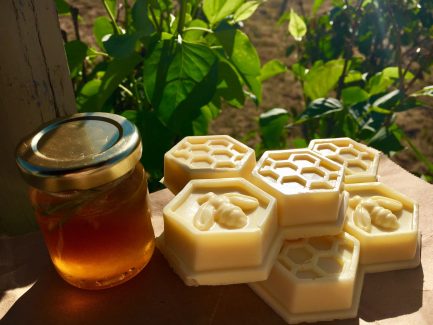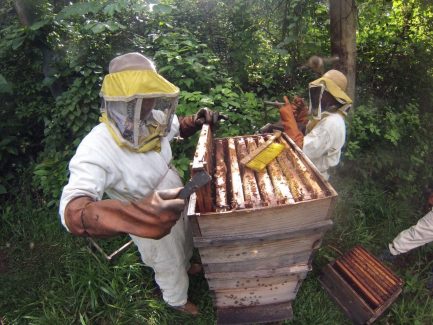What’s the buzz in the beekeeping and pollination industry right now? The answer: Dawn Musil’s HiveLend, which aims to aide the pollination industry and make agriculture more sustainable.
Dawn Musil’s favorite part about her job is helping people understand what makes bees so important. “Bees are super sexy right now,” she explained, in reference to how the declining number of bees has been a trending topic in the last couple of years.
“But helping people understand why they’re important…I love that.” HiveLend is an online platform that works to connect farmers with beekeepers so that their crops obtain the necessary pollination to grow.
Musil has been beekeeping on her family’s farm outside of Lancaster, Ohio since she was 14 years old. Musil explained that her family had noticed their apple orchard yielding less and less apples each year, which they attributed to not having enough pollinating insects on their farm. Their solution? Bees. “I was like, ‘I’ll be the head beekeeper,’” Musil said. And from that, a passion was sparked.
At HiveLend, Musil is what she calls, “a passionate beekeeper” and an “obsessive agricultural analyst.” Here, she’s working to understand if HiveLend’s current strategies are the best way to optimize pollination, and how the platform can change the world with bees.
Musil explained that bees are important due to their crucial part in the pollination process. Thirty five percent of the food we eat, including almonds, strawberries and melons, are pollinated by bees.
Currently, the United States is losing around 30 to 40 percent of hives during the winter, which makes it difficult for crops to survive.
“When we had smaller scale farms, you could just rely on the bees that were around to pollinate your plants,” Musil said, “But now we bring pollinators in.
” Before HiveLend, farmers would rely on calling or visiting pollination brokers if their plants needed to be pollinated. However, because of the loss of so many natural pollinators, the industry needs the help of hobbyist beekeepers — those who keep a small amount of hives. HiveLend transformed the process by putting this transaction online. Farmers and beekeepers are able to register on the HiveLend website, making it easier for all parties involved.
Musil and co-founder Nick Zajciw still have a lot to figure out — including how to market to farmers — but they are not discouraged. “If this was easy, someone else would have already done it,” Musil says. “So we’re trying to figure out what it looks like to follow this path that we’re on.”
As for the future of HiveLend, Musil hopes to facilitate a more local and sustainable pollination industry. Musil and Zajciw plan to do this by connecting small scale beekeepers with farmers already in their location.
“There are going to be [around] 9.5 billion people to feed by 2050 and we are right now incredibly short of those numbers,” says Musil.
“We can’t increase the land size we’re using, so we need to be more effective about the land that we do have, that we are using. And that’s what we hope to bring to the table with HiveLend, is a platform that makes agriculture as it stands sustainable.”








